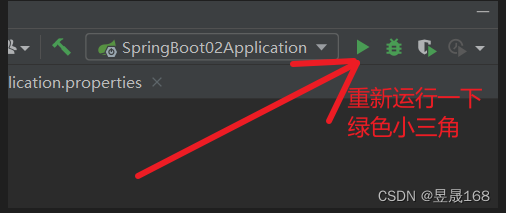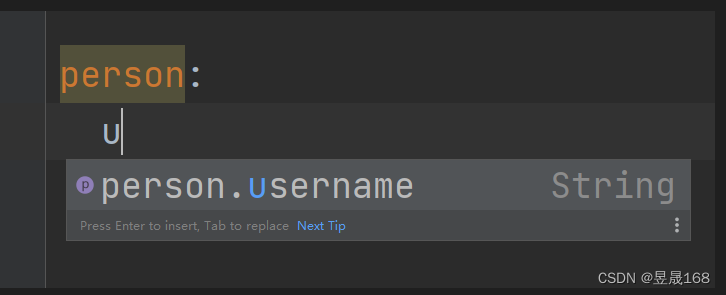SpringBoot 配置文件
昱晟168 人气:01.文件类型
A.properties配置文件类型
同以前properties用法一样
B.yaml
简介:
YAML 是 "YAML Ain't Markup Language"(YAML 不是一种标记语言)的递归缩写。在开发的这种语言时,YAML 的意思其实是:"Yet Another Markup Language"(仍是一种标记语言)。
非常适合用来做以数据为中心的配置文件
基本语法
- key :value ;键值对象之间必须有一个空格
- 大小写敏感
- 使用缩进表示层级关系
- 缩进不允许使用tabl,只允许空格
- 缩进的空格数不重要,只要相同层级元素左对齐即可
- #表示注释
- 字符串无需要加引号,如果要加''或""字符串内容会被转义或不转义
注意是:字符串不需要加引号,如果加了''单引号或""双引号内容会被转义【单引号转义】或不转义【双引号不转义】
数据类型
A.字面量:
单个的,不可再分的值。date boolean string number null
K: V #键值对之间必须有一个空格
B.对象 键值对的集合
map Object hash
#行内写法:
K: {k1:v1,k2:v2,k3:v3}
#或者
K:
K1: v1 #键值对之间必须有一个空格
k2: v2
k3: v3
C.数组:一组按次排列的值。
array list set queue
#行内写法
K: [v1,v2,v3]
#或者
K:
- v1 # `-`与`value`值一定要有一个空格
- v2
- v3
示例:
POJO
@Data
@AllArgsConstructor
@NoArgsConstructor
@ToString
@Component
public class Pet {
private String name;
private Double weight;
}@Data
@AllArgsConstructor
@NoArgsConstructor
@ToString
@Component
@ConfigurationProperties(prefix = "person")
public class Person {
private String username;
private Boolean boss;
private Date birth;
private Integer age;
private Pet pet;
private String[] interests;//兴趣
private List<String> animal;
private Map<String,Object> score;
private Set<Double> salary;
private Map<String,List<Pet>> allPets;
}
yaml配置文件
person:
#字面量
username: 海康
boss: true
birth: 2000/11/04
age: 21
#对象 键值对
pet:
name: 阿狗
weight: 20.28
#数组
# interests: [听歌,打代码,跑步] #行内写法
interests:
- 听歌
- 打代码
- 跑步
#List 集合【和数组写法一样】
# animal: [阿狸,阿猫,阿狗] #行内写法
animal:
- 阿狸
- 阿狗
- 阿猫
#set集合【和数组写法一样】
# salary: [8888.8,9999.9,28168.88] #行内写法
salary:
- 88988.99
- 978988.9
- 9999168.98
#Map<String,Object>集合
score:
java: 88.8
C++: 88.99#Map<String,List<Pet>> 集合
allPets:
haikang:
- name: 阿狸
weight: 20.9
- name: 阿狗
weight: 30.2
iaia: [{name: 阿联,weight: 20},{name: 阿哈,weight: 21}]
controller控制器
@RestController// 表示该类是一个控制器并且只响应浏览器不进行页面跳转
public class HelloController {
@Autowired
Person person;
@RequestMapping("/person")
public Person person(){
System.out.println(person);
return person;
}
}
2.配置提示
由于在核心配置文件中,配置我们自定义配置信息【自定义的类和配置文件绑定】,IDEA没有提示
例如:上述示例一样没有提示
配置提示步骤:
步骤1:引入依赖
在pom.xml加入
<dependency>
<groupId>org.springframework.boot</groupId>
<artifactId>spring-boot-configuration-processor</artifactId>
<optional>true</optional>
</dependency>
步骤2:加入下面插件,排除在打包时,将configuration-processor的引入打包jar
在pom.xml加入
<build>
<plugins>
<plugin>
<groupId>org.springframework.boot</groupId>
<artifactId>spring-boot-maven-plugin</artifactId>
<configuration>
<excludes>
<exclude>
<groupId>org.springframework.boot</groupId>
<artifactId>spring-boot-configuration-processor</artifactId>
</exclude>
</excludes>
</configuration>
</plugin>
</plugins>
</build>
步骤3:重新运行RUN


例如:
<dependencies>
<dependency>
<groupId>org.springframework.boot</groupId>
<artifactId>spring-boot-starter-web</artifactId>
</dependency>
<dependency>
<groupId>org.springframework.boot</groupId>
<artifactId>spring-boot-starter-test</artifactId>
<scope>test</scope>
</dependency>
<dependency>
<groupId>org.projectlombok</groupId>
<artifactId>lombok</artifactId>
</dependency>
<dependency>
<groupId>org.springframework.boot</groupId>
<artifactId>spring-boot-configuration-processor</artifactId>
<optional>true</optional>
</dependency>
</dependencies>
<build>
<plugins>
<plugin>
<groupId>org.springframework.boot</groupId>
<artifactId>spring-boot-maven-plugin</artifactId>
<configuration>
<excludes>
<exclude>
<groupId>org.springframework.boot</groupId>
<artifactId>spring-boot-configuration-processor</artifactId>
</exclude>
</excludes>
</configuration>
</plugin>
</plugins>
</build>加载全部内容